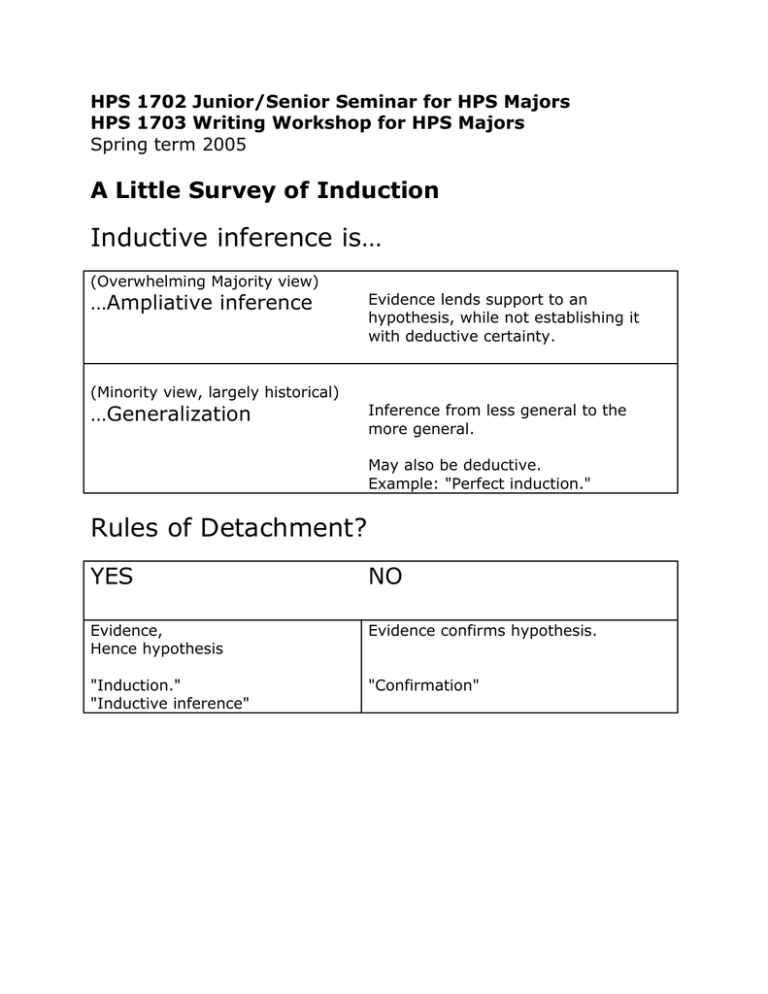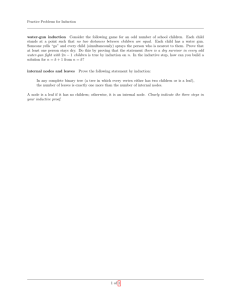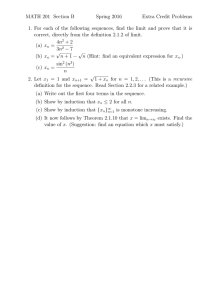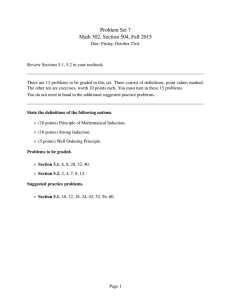Inductive inference is… A Little Survey of Induction …Ampliative inference
advertisement

HPS 1702 Junior/Senior Seminar for HPS Majors HPS 1703 Writing Workshop for HPS Majors Spring term 2005 A Little Survey of Induction Inductive inference is… (Overwhelming Majority view) …Ampliative inference Evidence lends support to an hypothesis, while not establishing it with deductive certainty. (Minority view, largely historical) …Generalization Inference from less general to the more general. May also be deductive. Example: "Perfect induction." Rules of Detachment? YES NO Evidence, Hence hypothesis Evidence confirms hypothesis. "Induction." "Inductive inference" "Confirmation" Three basic ideas drive all accounts of inductive inference. Family Inductive Generalization Hypothetical Induction Probabilistic Induction Principle An instance confirms the generalization. Ability to entail the Degrees of belief evidence is a mark governed by a of truth calculus. Archetype Enumerative induction Saving the phenomena in astronomy. Probabilistic analysis of games of chance Weakness Limited reach of evidence Indiscriminate confirmation Applicable to nonstochastic systems? Families develop through efforts to remedy weaknesses. Hybrids: Some accounts of induction straddle families. e.g. Achinstein's view, modern demonstrative, eliminative induction 2 Inductive Generalization Principle An instance confirms the generalization. Archetype Enumerative Induction Weakness Limited reach of evidence. Some A's are B All A's are B only narrowly applicable. Elaborations Hempel's Satisfaction Criterion Extend basic principle from simple syllogistic logic to first order predicate logic. Mill's Methods Generalize instances of necessary and sufficient conditions and interpret as causes. Glymour's Bootstrap Derive instance of hypothesis with assistance of any available theory. Demonstrative Induction Deduce hypothesis from evidence using auxiliary theory. 3 Hypothetical Induction Principle Ability to entail the evidence is a mark of truth. Archetype Saving the phenomena. Weakness Too indiscriminate. Frivolous conjunction: A&B entails A; so A confirms B, for any B. Elaborations E confirms H if H (and auxiliaries) entail E AND… Examples Exclusionary accounts. Error statistics (Mayo) Inference to common cause (Salmon, Janssen) …E most likely wouldn't be true, if H were false Controlled studies. Perrin's arguments for atoms. Simplicity … H is the simplest. Curve fitting. Abduction: Inference to the best explanation (Pierce, Harman, Lipton) …H is the best explanation. Galactic red shift. Controlled studies of telepathy. Reliabilism (Popper, Lakatos) …H has been generated by a reliable method. Any expert investigating. 4 Probabilistic Induction Principle Degrees of belief governed by a calculus. Archetype Probabilistic analysis of games of chance. Weakness Apply a calculus designed for dice games to beliefs about non-stochastic systems? Spurious numerical precision? Priors? Ignorance vs. disbelief? Elaborations Full-blown Bayesianism Interpretive agonies. Subjective, objective, logical? Justifications: Dutch book arguments, representation theorems. Washing out of the priors. Extended Bayesianism Convex sets of probability distributions. (and more) Alternative Calculi Shafer-Dempster theory. Possibility theory. **Theory of random propositions.** 5 Properties and Tendencies Family Distance between evidence and hypothesis Justification Inductive Generalization ("bottom up") Close. Invites logic of discovery. Self evidence. Case studies. Hypothetical Induction ("top down") Distant. Leans towards underdetermination Self evidence. Case studies. Probabilistic Induction ("relational") Elaborate and sophisticated. (Bayesians) Rule of detachment? John D. Norton, Spring 2005 6




